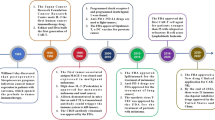Summary
In some human malignancies resistance to chemotherapy is caused by an energy-dependent efflux system, responsible for the removal of chemotherapeutics out of the resistant tumor cells. A major component of this efflux system is the permeability glycoprotein (p-glycoprotein), which depends on the multidrug-resistance geneMDR1.
We have tested p-glycoprotein in primary and metastatic human melanoma by use of the monoclonal antibody C219; a substantial expression was only observed in 1/37 primary melanomas and in 1/27 melanoma metastases. None of the patients with negative metastases responded to chemotherapy. Moreover a complete remission of metastasic growth was observed in the patient with the metastasis significantly expressing the p-glycoprotein. Sequential studies revealed no significant increase of p-glycoprotein-positive cells during and after chemotherapy. We conclude that drug resistance in human melanoma does not usually depend on the p-glycoprotein-related efflux system. Other mechanisms are obviously responsible for drug resistance in this human malignancy.
Similar content being viewed by others
References
De Vita VT, Hellmann S, Rosenberg SA (1985) Cancer: principles and practices of oncology, 2nd ed. Lippincott, Philadelphia
Goldstein LJ, Galski H, Fojo A, Willingham M, Lai S-L, Gazdar A, Pirker R, Green A, Christ W, Brodeur GM, Lieber M, Cossmann J, Gottesmann MM, Pastan I (1989) Expression of a multidrug resistance gene in human cancers. J Natl Cancer Inst 81:116–124
Kartner N, Evernden-Porelle D, Bradley G, Ling V (1985) Detection of p-glycoprotein in multidrug-resistant cell lines by monoclonal antibodies. Nature 316:820–823
Lemontt JF, Azzaria M, Gros P (1988) Increasedmdr gene expression and decreased drug accumulation in multidrug-resistant human melanoma cells. Cancer Res 48:6348–6353
Mattern J, Volm M (1989) P-Glycoprotein als Resistenz-Marker in Tumoren. Dtsch Med Wochenschr 114:1979–1981
Ostmeier H, Suter L (1989) The Ki-67 antigen in primary human melanomas — its relationship to mitotic rate and tumor thickness and its stability. Arch Dermatol Res 281:173–177
Roninson JB (1987) Molecular mechanism of multidrug resistance in tumor cells. Clin Physiol Biochem 5:140–151
Stacher A, Moser K (1986) Chemotherapie maligner Erkrankungen 3. Aufl Deutscher Ärzteverlag, Köln
Suter L, Bröcker E-B, Ostmeier H, Schumann J, Sorg C (1989) Metastatic human melanoma. Phenotypic heterogenity and antigen expression in relation to the clinical status. J Cancer Res Clin Oncol 115:459–464
Thiebaut F, Tsuruo T, Hamada H, Gottesmann MM, Pastan I, Willingham MC (1987) Cellular localization of the multidrug-resistance gene product p-glycoprotein in normal human tissues. Proc Natl Acad Sci USA 84:7735–7738
Author information
Authors and Affiliations
Additional information
This work was supported by the Deutsche Krebshilfe (grant M 55/85/Su1)
Rights and permissions
About this article
Cite this article
Fuchs, B., Ostmeier, H. & Suter, L. p-Glycoprotein expression in malignant melanoma. J Cancer Res Clin Oncol 117, 168–171 (1991). https://doi.org/10.1007/BF01613142
Received:
Accepted:
Issue Date:
DOI: https://doi.org/10.1007/BF01613142




